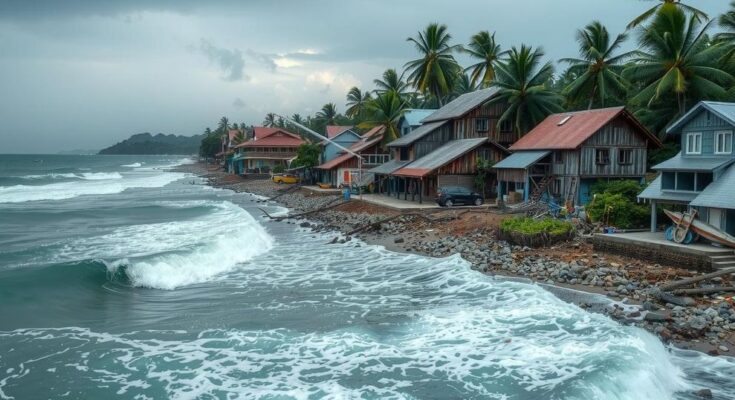The 20th anniversary of the 2004 Indian Ocean tsunami commemorates the disaster that claimed over 220,000 lives following a powerful earthquake off Indonesia. The event stressed the need for improved tsunami preparedness, resulting in global investments in warning systems. Despite advancements, the potential impact of tsunamis remains a critical concern for coastal communities.
This week marks the 20th anniversary of the devastating Indian Ocean tsunami, which resulted from a powerful 9.1-magnitude earthquake off the coast of Indonesia on December 26, 2004. This earthquake induced waves that wreaked havoc upon several coastal nations, leading to a tragic loss of over 220,000 lives. The tsunami’s impact was felt across Indonesia, Sri Lanka, India, Thailand, and beyond, with the areas of northern Sumatra suffering the most casualties. The calamity prompted significant international humanitarian aid totaling approximately $14 billion and led to substantial reconstruction efforts.
The earthquake, which occurred at 7:59 AM, broke along a faultline exceeding 1,200 kilometers (750 miles) in length, generating waves that soared over 30 meters (100 feet). The energy released was comparable to that of 23,000 Hiroshima atomic bombs, resulting in devastation across a broad area. Initially recorded as an 8.8 magnitude event, subsequent measurements confirmed its magnitude at 9.1. The epicenter was situated 150 miles off the coast of Sumatra, within a region known for its high seismic activity due to the Pacific “Ring of Fire.”
The toll of the tsunami was catastrophic; according to the Emergency Events Database (EM-DAT), 226,408 individuals succumbed, with the majority of deaths occurring in Indonesia, specifically in northern Sumatra. Moreover, thousands perished in Sri Lanka, India, and Thailand, with reports of casualties reaching nearly 300 in Somalia and over 100 in the Maldives. The disaster displaced more than 1.5 million people nationwide, necessitating a global response mobilized to rebuild lives and communities devastated by the waves.
In the aftermath, extensive reconstruction transformed areas such as Banda Aceh, where the Indonesian government facilitated the construction of over 100,000 homes in the affected province of Aceh. The tragedy underscored the critical need for tsunami preparedness; at the time, no warning systems existed within the Indian Ocean region. In response to this failure, investments exceeding millions of dollars have been directed towards enhancing tsunami warning systems worldwide, currently comprising 1,400 monitoring stations. Although significant advancements have been made, experts caution that the dangers associated with catastrophic tsunamis can never be entirely eliminated.
The 2004 Indian Ocean tsunami represents one of the most devastating natural disasters in recorded history. Triggered by a significant seismic event, it highlighted the vulnerabilities of coastal regions to such catastrophic occurrences. The sheer scale of human and infrastructural loss provoked a concerted international humanitarian response and a reevaluation of emergency preparedness protocols in tsunami-prone areas. The anniversary serves as a poignant reminder of the ongoing need for vigilance and investment in disaster readiness.
In conclusion, the 20th anniversary of the 2004 Indian Ocean tsunami is an opportunity to reflect on the lessons learned from this tragic event. The calamity claimed over 220,000 lives and displaced millions, necessitating a vast international relief effort and significant reconstruction initiatives. While advancements in tsunami warning systems indicate progress, the importance of preparedness and community resilience in the face of natural disasters remains paramount.
Original Source: www.france24.com




